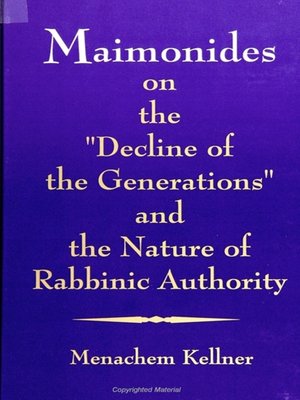Maimonides on the "Decline of the Generations" and the Nature of Rabbinic Authority
ebook ∣ SUNY series in Jewish Philosophy
By Menachem Kellner

Sign up to save your library
With an OverDrive account, you can save your favorite libraries for at-a-glance information about availability. Find out more about OverDrive accounts.
Find this title in Libby, the library reading app by OverDrive.



Search for a digital library with this title
Title found at these libraries:
| Loading... |
Moses Maimonides, medieval Judaism's leading legist and philosopher, and a figure of central importance for contemporary Jewish self-understanding, held a view of Judaism which maintained the authority of the Talmudic rabbis in matters of Jewish law while allowing for free and open inquiry in matters of science and philosophy. Maimonides affirmed, not the superiority of the "moderns" (the scholars of his and subsequent generations) over the "ancients" (the Tannaim and Amoraim, the Rabbis of the Mishnah and Talmud) but the inherent equality of the two. The equality presented here is not equality of halakhic authority, but equality of ability, of essential human characteristics.
In order to substantiate these claims, Kellner explores the related idea that Maimonides does not adopt the notion of "the decline of the generations," according to which each succeeding generation, or each succeeding epoch, is in some significant and religiously relevant sense inferior to preceding generations or epochs.
In order to substantiate these claims, Kellner explores the related idea that Maimonides does not adopt the notion of "the decline of the generations," according to which each succeeding generation, or each succeeding epoch, is in some significant and religiously relevant sense inferior to preceding generations or epochs.






